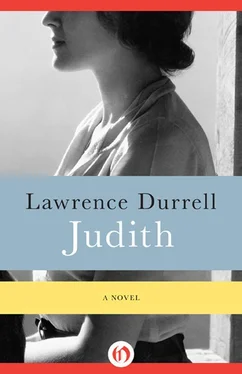As late as 1972 — that is, after the publication of his next major novel sequence, Tunc and Nunquam — Durrell was still contemplating publication of Judith. 11 We do not know at what stage he decided to merge the first two versions of the novella into one story, splitting the Judith character into Judith (still a scientist) and Grete (the wife of Günther Schiller) and introducing the character of David as Grete’s lover, to balance the relationship between Judith and Aaron Stein. This development almost certainly came after the release of the film of Judith in January 1966. Durrell’s title for the expanded novel was ‘Double Scenario’. This was presumably a working title, intended to indicate that there were now two storylines: that of Judith (as in the first version) and that of Grete, who replaced the ‘Judith’ of the second version. It is an unwieldy title, and I have therefore preferred to retain ‘ Judith’ as the title of this expanded novel. The typescript (which was most likely prepared by a professional typist) contains some anomalies, which Durrell clearly did not have the opportunity to correct. Some of these have been silently corrected; others are discussed below.
Durrell’s writing styles
Throughout his career as a novelist, Lawrence Durrell wrote on two levels: intense, passionate, intellectual novels such as The Alexandria Quartet (1957–1959), and lighter, less serious, more easily written (and more easily read) stories, which he disparagingly referred to as ‘pot-boilers’. In fact, the chronology of his published work indicates that, in most cases, the ‘serious’ and the ‘lighter’ works alternated, as if, having completed a demanding undertaking such as the Quartet , he turned to story-telling which allowed him to continue in the obsessional writer’s craft without trying to reach for the literary stars.
In 1937, Lawrence Durrell was living in Corfu, and had already published his first novel, Pied Piper of Lovers , and, under the pseudonym of ‘Charles Norden’, his second, Panic Spring ; and he had written the novel which he later regarded as carrying the first sound of his true voice, The Black Book . (The pseudonym was used because Pied Piper of Lovers had not met with critical acclaim.) Having attracted the enthusiastic support of Henry Miller for The Black Book , Durrell wrote to him:
My double Amicus Nordensis. He is a double I need…You see, I can’t write real books all the time…Once every three years or more I shall try to compose for full orchestra. The rest of the time I shall do essays, travel-books, perhaps one more novel under Charles Norden. I shall naturally not try to write badly or things I don’t want to: but there are a lot of things I want to write which don’t come into the same class as
The Black Book
at all.
12
To which Miller forcefully replied:
Don’t…take the schizophrenic route!…You must stand or fall either as Charles Norden or as Lawrence Durrell. I would choose Lawrence Durrell if I were you…If, as you say, you can’t write REAL books all the time, then don’t write. Don’t write anything, I mean. Lie fallow…Why couldn’t you write all the other books you wish as L.D.? Why can’t L.D. be the author of travel books, etc.?
13
As a result of this retort from Miller, Durrell did ‘kill off’ his double, and continued to write the travel books, essays and novels under his own name: his memoir of Corfu, Prospero’s Cell (1945), was his next major prose work, and if we examine the chronology of his prose publications thereafter, the alternation of ‘real’ books and lighter stories becomes clear: Cefalù (later republished as The Dark Labyrinth ) in 1946, Reflections on a Marine Venus (‘a companion to the landscape of Rhodes’, 1953), and Bitter Lemons (about his years in Cyprus during the Enosis crisis, 1957) led up to the appearance between 1957 and 1959 of the work with which his name is most frequently associated, The Alexandria Quartet.
Of his works up to this point, The Dark Labyrinth is the least demanding: a didactic novel on a programmatic basis, with each character confronting his or her personal destiny within the framework of a Cretan labyrinth. When he was writing it, Durrell told Miller, ‘I have deliberately chosen a cheap novel formula…A rotten book but with some small lucid moments and one or two good lines’. 14Readers of Judith will readily see that not only does this novel have ‘some small lucid moments’ — some of them of great beauty and, usually, poignancy — but that the Durrell hallmark of memorable phrases and acute insights is, though to a lesser extent than in his ‘real’ books, present throughout, in his commentary — sometimes cynical, always with a wry humour — on the behaviour of his characters.
Durrell’s view of The Dark Labyrinth as ‘a rotten book’ is so self-deprecatory as to be absurd, especially when it has in fact been very highly regarded by the critics. This, and other books in the ‘cheap novel formula’ were, in fact, the product of what Miller had foreseen as his ‘fallow’ periods. Judith — unpublished until now — was written in the difficult years for Durrell between the completion of the Quartet and his struggle with its successor, the twin novels Tunc (1968) and Nunquam (1970), which were drafted in parallel with Judith under the working title ‘The Placebo’. In these ‘fallow’ years, during which he was preoccupied with the ill-health of his wife, Claude, he also produced his translation of the nineteenth-century Pope Joan by the Greek author Emmanuel Royidis, and most of his ‘Antrobus’ sketches of diplomatic life as he had observed it while working at the British Embassy in Belgrade, then the capital of the Yugoslav Federation. 15Yugoslavia had also given rise to his 1957 novel of espionage and suspense, White Eagles over Serbia — another example of his capacity for a storyline which grips the reader without making exceptional literary demands.
In fact, almost all Durrell’s novels combine the dual elements of what Kipling called ‘the game’ and ‘the quest’, as exemplified in his Kim , which Durrell himself called his ‘bedside book’. The ‘game’ involves a secret which must be discovered in the book’s dénouement , and the ‘quest’, which runs parallel to the public ‘game’, is the individual’s pursuit of self-knowledge. The reader’s attention and loyalty are sustained by the author’s capacity to entwine the two within a single narrative structure.
G. S. Fraser (a wartime contemporary of Durrell in Egypt), who wrote the first major study of Durrell’s work, recorded that ‘the Wodehousian humour of the Antrobus stories, the Buchanesque thrills of White Eagles over Serbia , have helped to keep the pot boiling. Durrell, with typical versatility, was working when I visited him in Corfu on the script and general advice for an American film, a documentary one, about the voyages of Odysseus’. In relation to Judith , Fraser remarked, ‘this was obviously a hastily novelized filmscript and one wondered even whether Durrell, who had written the script, had himself done the novelizing’. 16
The level at which the author can pitch his narrative depends on many factors, such as the basic material of the plot — which, as in the case of Judith , might be quite deeply researched — and the evolution of the characters as the writing progresses. But it also depends on the author’s emotional and material circumstances: financial and other necessities might dictate the composition of a ‘pot-boiler’ when the writer would prefer to pursue a more intimate and introspective line of enquiry (even though that would still demand a clear storyline). And the reverse might be the case, as it was with Durrell after the success of the Quartet , when he started to address the twin themes of Judith while considering its potential as a filmscript.
Читать дальше












